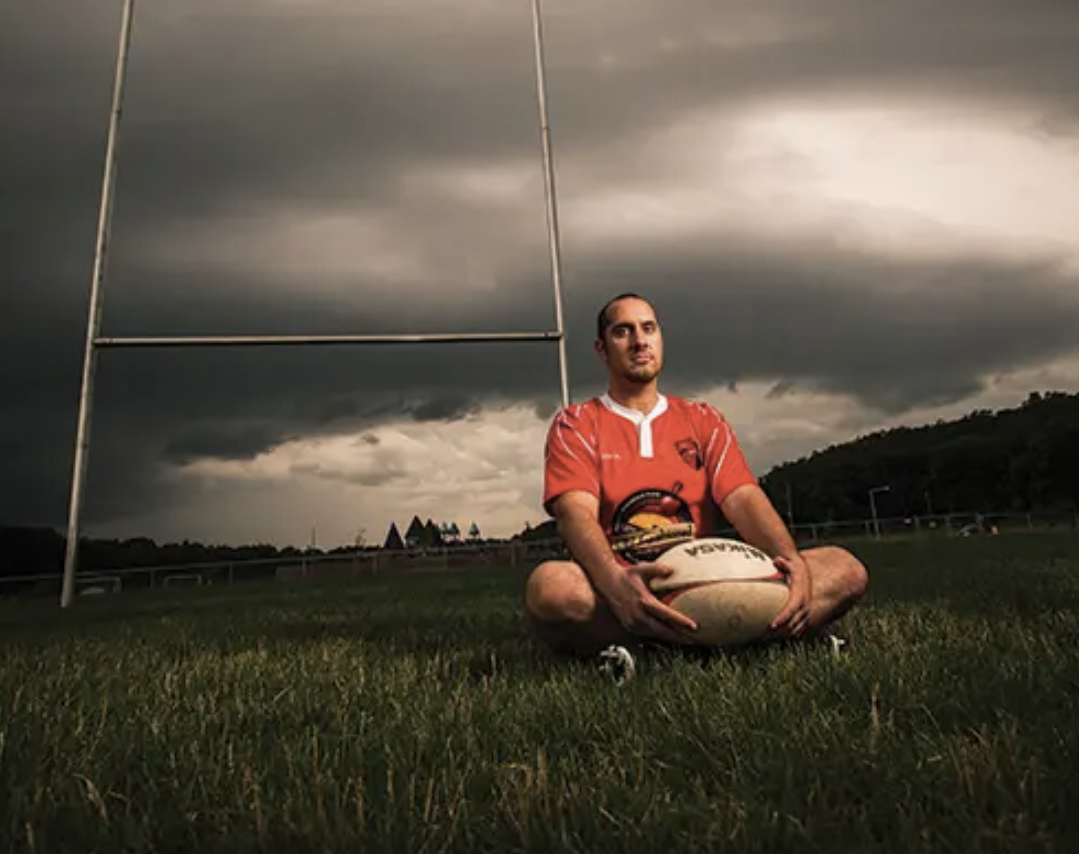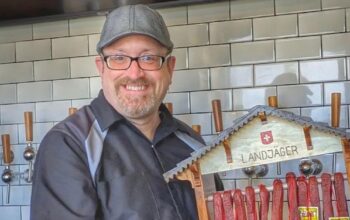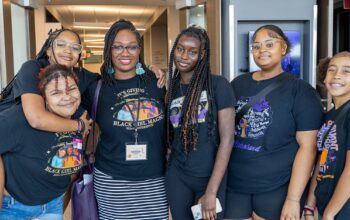Tim Lom knew next to nothing about rugby when a friend approached him with the idea of forming a gay/inclusive team in Madison. Following their first practice in early March of 2007, he knew he was in for a grueling — albeit fulfilling — experience. Lom’s physicality began and ended with high school opera chorus and video games, yet he was almost instantaneously sold on the togetherness he felt through rugby despite the shock of learning an entirely new sport. He met good people, got a little exercise and discovered he possessed an ability he hadn’t previously believed he had — working with others as a team.
The rest was history. The Madison Minotaurs are now a registered nonprofit organization competing locally and internationally in the International Gay Rugby league, and invite people of all ages, genders, identifications and skill levels to join them.
What do you think is the biggest challenge our community faces?
The one challenge that I’ve really been following and working my best to understand over the past four or five years is the scapegoating, marginalization and vilification of trans people, especially trans athletes. It’s not just a community issue, but it starts there with pushing back against it and protecting trans kids who want to play sports. That’s my most immediate concern. Seeing the Wisconsin State Legislature introduce resolutions to force kids to play sports on the gendered team that they were assigned at birth is really harmful to our community at large. It’s a really bad precedent to be setting and I very much stand against it.
We’ve had gay, trans, nonbinary and queer identifying players on our team that we try our best to support, but there’s a big push by the state to put people into boxes and to cause harm to vulnerable populations by forcing them to either not be true to themselves or to not play sports. As somebody who was bullied in school, sports were a non-starter for me. I knew from a very young age, instinctively, that that type of environment would be toxic for me. So I’ve spent the past 15 or 16 years trying my best to create an environment in which nobody would feel that way. To see that institutionalized by the legislative body is really upsetting to me. A lot of legislation has been vetoed by our governor, and that’s great, that’s wonderful, but more people need to see this for what it is — scapegoating and picking on a marginalized group that needs help and deserves to be defended.
To a lesser extent, things like the gay conversion therapy ban that Republicans tried to block ... things like that are harmful and hurt my community. I want to see trans and queer kids thrive.
What do you wish people in our community understood better?
Toughness doesn’t have a gender. Meeting other queer men that play rugby and meeting a lot of queer women and trans identifying people that play rugby — it’s not about proving anything. There’s a certain amount of “Can I do this? Can I challenge myself to play this really brutal sport?” It can be really demanding physically. There’s no stoppage of play in rugby. It’s 80 minutes nonstop, so you do have to have a certain level of fitness and mental endurance — but it’s really about proving that regardless of where you come from, what your background is, you’re capable of being tough and resilient and working as a team.
I think a lot of queer people’s experience [in sports] was that they would be a bit of a lone wolf socially, and there’s something to be learned about working together and knowing that no matter where you come from you have the opportunity to do that. Whether you’re 12 or 22 or whatever age, you can learn that. We try to keep an inclusive atmosphere in which your body type, your fitness level, your experience level, your gender, it doesn’t matter. You are welcome and we will find a place for you on the team and on the field, even if that means only coming to practices. We’ll find a way to include you. That’s our goal: to refute any negative stereotypes that come our way and defend ourselves.
In the first few years we started we did have a few incidences of other clubs throwing homophobic abuse at us. I think when you have your friends who are in it with you, you do have a feeling of “I can overcome these obstacles” and that nothing is too difficult to be impossible. We can support each other, and we can get through this. I think that’s something that’s really important for people to understand.
I know that for a long time I had my own preconceived notions that sports were masculine, or that sports were about being tough. I think, to some degree, I was projecting. But the people I’ve met playing this game have taught me so much. There’s wheelchair rugby, there’s tough rugby, there’s all sorts of variations to accommodate different body types and different experience levels, and it’s a great thing to be a part of. It’s not all just drinking and bellowing and hitting people. There’s a lot more to it than that.
What is one change you would make if you could that would make life better for people in our community?
It’s so important to hear people out. If they’re reasonable and acting in good faith we need to listen to them and find a way to reach common ground, especially people in positions of relative privilege. If you hear something that may be anti-LGBTQ, gently push back. Ask people what they mean, and try to find some common humanity in some way. With the way that the internet has shaped social discourse it’s very easy to write people off because you infer something bigoted — and nine times out of 10 it’s because it is — but whatever hearts and minds you can change and get to understand humanity, you need to do the work and make it happen. If there’s one change I could make it would be that if you think you could make a difference in the way that somebody sees queer people, do it. It can be easy to shut people down when they disagree with you, especially when those disagreements are based on identity and your rights and your dignity, but I think there are times when you can get through to those people. You don’t have to convince somebody that they’re wrong, but it’s beneficial to let people know how their words could be coming across.
What in our community gives you hope?
Younger people. I’m old enough to remember the vile, disgusting backlash to gay marriage and all of these things we thought were settled but maybe aren’t settled. I’m also old enough to remember cis-white people who thought, “We have the right to get married, so nobody else needs defending if I’ve been defended.” That’s not what I’m seeing from young people. I’m seeing a real, incredibly well-educated, highly socially intelligent generation that is constantly impressing me with the way they engage in dialogue with people who disagree with them.
What used to be a fringe humanist worldview seems to have been mainstreamed with a lot of the younger generation. That’s honestly what gives me hope. Seeing young people protest transgender bathroom bans and gun violence and all of these other things ... that’s the stuff that really gives me hope. I was always told that the older you get the more conservative you get, but the older I get the more hopeful I’m getting about the future.
We have people on our team who don’t identify with the LGBTQ+ community, and their views are so open-minded. They just seem to understand the crux of judging people by the content of their character as opposed to their identity alone. So much of the shame that my generation grew up with about these types of things is just gone. Or at least less internalized.





